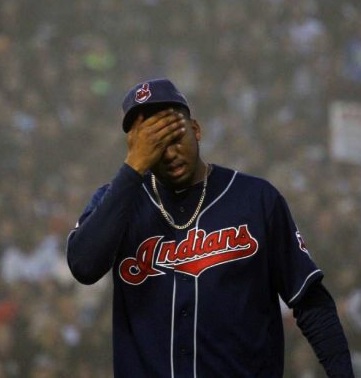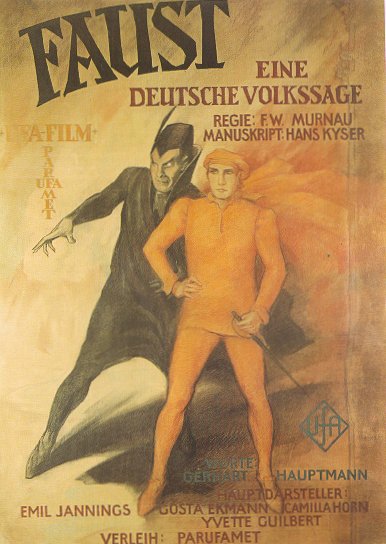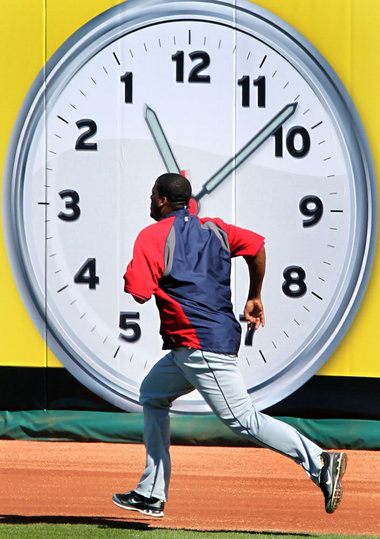 When the day started, Indians right-hander Fausto Carmona still had the quirky distinction of being the only “Fausto” to take the mound in the history of Major League Baseball. By the evening, he was suddenly just another Roberto… and three years older. I suppose this isn’t such a shocking development within the context of Cleveland Indians history, with its Ten Cent Beer Nights and wife-swapping incidents. But even as the actual details trickle in on Carmona’s false identity arrest in his native Dominican Republic, the former English student in me can’t help but gravitate toward the big glaring literary allusion in this ridiculous story. He freaking named himself “Fausto!”
When the day started, Indians right-hander Fausto Carmona still had the quirky distinction of being the only “Fausto” to take the mound in the history of Major League Baseball. By the evening, he was suddenly just another Roberto… and three years older. I suppose this isn’t such a shocking development within the context of Cleveland Indians history, with its Ten Cent Beer Nights and wife-swapping incidents. But even as the actual details trickle in on Carmona’s false identity arrest in his native Dominican Republic, the former English student in me can’t help but gravitate toward the big glaring literary allusion in this ridiculous story. He freaking named himself “Fausto!”
Prologue: The "Tragical History" of Fausto Carmona
Whether you know the classic legend of Faust or not, you’re unavoidably aware of its resonance in Western culture. Today, the term “Faustian bargain” is synonymous with “deal with the devil,” and while it’s probably referenced more in the context of Robert Johnson at the crossroads than a mythical doctor in Deutschland, everybody pretty much gets the gist of the tale. Still, since most of us have presumably been out of college for a while, let’s break out the source material (no citations necessary) and briefly review this Faust thing and why it’s kind of relevant to our new/old friend Roberto Hernandez Heredia.
Part I. The Faust Legend
Okay, so here’s a basic rundown of the Faust legend, as passed along through centuries of books, plays, paintings, films, music, and most other things that can involve some kind of narrative…
Faust is a smart and talented fellow—let’s say, a doctor-- but he’s also a bit of the snooty, jaded type, and isn’t satisfied with what he’s got. He wants to advance to bigger and better things—to make his wildest dreams a reality. And lucky for him, this impossible goal actually becomes feasible when Faust happens upon the devil, aka Mephistopheles, just chilling in the woods or something. The two get to talking, and Mephy starts negotiating a deal built around Faust’s ambitions. They come to a gentleman/demon agreement. Mephistopheles will use his powers to get Faust everything he wants for a certain number of years, but once Faust has hit his peak of personal satisfaction, the Devil will come collect on the doctor’s soul and send him down to the lake of fire.

Naturally, things go great for a while, as Faust gains limitless knowledge, scores hot chicks, attains massive wealth, and pretty much reaches Jay-Z levels of untouchability. But as promised, the devil eventually comes to collect, leaving the reader to presume that eternal damnation is proportionally worse than a decade or so of mega awesomeness on Earth.
The Faust tales dates back to a German myth from at least the 16th century and probably much older. The basic characters, storyline, and themes would be recycled in a bunch of classics, including the British playwright Christopher Marlowe’s The Tragical History of Dr. Faustus (1604), the two-part epic Faust by iconic German author Johann Wolfgang von Goethe (early 1800s), and Thomas Mann’s novel Doctor Faustus (1947). Then you’ve got the literally thousands of adaptations of the story in new, modern packages, from Damn Yankees and Little Shop of Horrors to “The Devil Went Down to Georgia” to that really shitty Brendan Fraser vehicle Bedazzled. The details change, but the song remains the same: giving up one’s soul for earthly gains is tempting, but probably not a good idea.
Part II: Fausto as a Faustian Character
It remains to be seen whether the pitcher formerly known as Fausto Carmona will one day warrant his own cinematic retelling of the Faust legend. Honestly, any studio that would greenlight that horrible idea probably should be shut down before casting starts. But, if we imagine what such a movie might look like, it’d probably open with an exterior shot of Jacobs Field on October 5, 2007. In the midst of a Division Series playoff battle between the Cleveland Indians and New York Yankees, a massive cloud of pesky insects suddenly descends into the stadium like a wrathful bug invasion out of biblical times.
On the field, Yankees star pitcher Joba Chamberlain is covered in the fluttering midges, unable to concentrate on the task at hand as the Tribe rallies to tie the game late. His counterpart, however—Indians starter Fausto Carmona—is seemingly unfazed by the crawly creatures. As if protected by special, otherworldly powers, Carmona pitches nine brilliant innings in the bug storm, and the Indians go on to win the game and the series.
Then we flashback ten years, to 1997, in a small neighborhood in Santo Domingo, D.R. Here we meet a young man named Roberto Hernandez Heredia—a 17 year-old pitcher with loads of natural talent, but great concerns about his future. Will his sinkerball ever sink the way he wants it to? Will he ever impress American scouts enough to get signed? To get out of Santo Domingo? To play in the Bigs? To support his family?
During the height of young Roberto’s worrying, he meets a local sports agent named Jose. Jose Mephistopheles. And Jose says he can help the youngster achieve all his lofty goals. To do this, however, some sacrifices will need to be made. First and foremost, there's the age problem. Roberto will need a few years to develop his skills, and by the time he's ready to wow scouts, he'll be pushing 20-- way too old. So, when those scouts come around, Roberto must tell them he is actually three years younger than his true age. Secondly, and this is the biggie, Roberto must change his name. Otherwise, it would be too easy for scouts and/or government officials to find out the truth about his age and background. From now on, in order to get to where he wanted to go, Robert Heredia would have to become… Fausto Carmona.

From there, of course, we follow Fausto on his rise through the Indians’ minor league system and his impressive victory in his first Major League start in 2006. We skip over the rest of 2006 a bit (he lost his next 10 decisions) because it doesn’t fit our narrative as well. Then we jump back in with that tremendous ’07 campaign, in which—with the continued “assistance” of his friend Mr. Mephistopheles—Fausto finishes fourth in Cy Young voting with a 19-8 record and 3.06 ERA.
Despite the success, though, Fausto remains constantly concerned that his deal with Mephistopheles will come to light—that everyone will learn he is not whom he has claimed to be. These worries begin to manifest themselves on the mound, where Carmona becomes famous for sweating profusely and yelling at himself between pitches, nervously re-adjusting his cap and shirt like a piss-poor poker player with a straight flush.
Despite the obvious signs of his deceit, though, no one in Cleveland is the wiser. And even after an extremely inconsistent 2011 season, Carmona finds himself rewarded by his old agreement with Mephistopheles again, as the Indians improbably agree to pick up Fausto’s $7 million option for 2012. He is the rich, successful Major Leaguer he had always dreamed of being. And as he concludes a joyous offseason in his homeland, it nearly escapes his mind that there was another part to that deal he signed as a wide-eyed teenager. “When you have reached the peak of your success,” Mephistopheles had said, “you will be arrested by the Dominican National Police for trying to obtain a visa with a false identity.”
It might not be hell, but it's safe to assume a Dominican jail cell ain't a long way from it for Dr. Fausto.